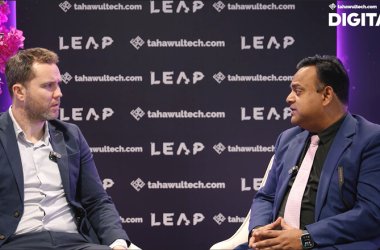Veronica Martin spoke to Sven Denecken, SVP & Chief Marketing and Solutions Officer for SAP Industries & CX at SAP, during The Future of Business Summit in Walldorf about how SAP collaborates with customers and partners to develop industry-specific solutions, how his previous experience has shaped his approach to supporting SAP’s industry customers and what role SAP plays in helping industries adapt to rapidly changing technological landscapes.

Could you elaborate on how SAP collaborates with customers and partners to develop industry-specific solutions for digital transformation?
First and foremost, our vast customer base, exceeding 400,000, is complemented by an extensive ecosystem. Identifying our position at what I call the ‘vertical edge,’ which is highly industry-specific, is of paramount importance. While the spotlight often shines on our efforts towards standardisation, my organisation is dedicated to a distinctive aspect known as ‘industry advisory councils.’
Within this framework, we convene a diverse array of customers, ranging from the largest to the smallest, the most loyal to the most innovative. Our aim is to facilitate discussions around use cases, processes, and innovations that they may perceive as non-differentiating. This process enables us to standardize or incorporate these insights into our platform seamlessly. This approach, which I refer to as ‘core innovation,’ has been a cornerstone of our operations for many years.
What are some examples of business solutions SAP has developed to address industry-specific processes?
Let’s focus on the retail industry, which has been undergoing significant transformation alongside the automotive sector. Retail is a stark example: either you establish an online presence or risk losing customers who prefer the convenience of e-commerce. This transformation was rapid, challenging, and marked by numerous mistakes. Now, as we transition to a more normalized business environment, two noteworthy trends have emerged.
Firstly, online presence remains crucial, but customers are gradually returning to physical stores. To bridge this evolution, we’ve introduced an innovative solution on our industry cloud platform: AI-powered replenishment automation.
Secondly, the challenge lies in seamlessly sharing data between online interactions and in-store experiences. These processes have been traditionally tailored for retailers. However, consider a scenario where you operate a filling station, and a significant portion of your profit comes from in-store sales. In such cases, it becomes imperative to harness this capability. Hence, we’ve designed this solution as an industry cloud offering. While the standard purchase and construction processes remain highly standardized, this unique differentiator allows us to seamlessly integrate it.
Q3. As the Senior Vice President of Marketing and Solutions for Industries and CX at SAP, how do you contribute to the go-to-market approach?
My role involves a deep dive into our engineering processes, as well as those of our partner organizations. Interacting with customers and clients is their primary focus, and my team specializes in this aspect. While we maintain a close connection with engineering, we also keep a finger on the market’s pulse. We utilize conventional marketing principles, such as assessing the addressable market and evaluating different geographies in Asia. In some regions, it’s not a matter of ‘if’ but ‘when,’ while in others, there’s a cautious approach, characterized by a desire to test the waters and understand how things work before diving in.
Our team plays a pivotal role in striking the right balance, ensuring that technology, engineering, market priorities, and marketing efforts are all harmonized. This involves effective communication strategies to successfully introduce our solutions to the market.
How have your various roles, including ERP product management and post-merger integration, shaped your approach to supporting SAP’s industry customers?
At SAP, we consistently view our strategies and approaches from an industry-specific perspective. Throughout my career, whether I was involved in acquisitions related to customer integration or focused on ERP solutions at the core, I always assessed which industries were poised for transformation and in need of our solutions. In my current role, this extensive knowledge base has proven immensely valuable. It enables me to identify the unique strengths that potential partners bring to the table. By seamlessly integrating them with SAP, our customers, and our technology, we unearth hidden opportunities that might otherwise remain undiscovered. This is achievable only when you possess a deep understanding of our products, the market dynamics, and, of course, the underlying technology.
What role does SAP play in helping industries adapt to rapidly changing technological landscapes?
We continuously explore emerging technologies in our innovation centres in collaboration with our partners. However, when it comes to achieving scalability and resilience at the enterprise level, it presents an entirely different challenge. While experimenting with various technologies is accessible to consumers, transitioning them to an enterprise-scale is where our team truly excels. As I provide feedback on the value and specific use cases these technologies should support, it becomes a mutual learning experience, allowing us to understand the requirements for resiliency. For instance, a decade ago, I initially perceived AI as a complex, PhD-level concept. Over time, I witnessed the rapid evolution and increasing significance of AI and machine learning.
I collaborated with our engineering team to understand the specific challenges customers face when aiming to scale in the retail and e-commerce sectors. With the shift away from physical stores, the responsibility of delivering a seamless service falls heavily on a robust platform. We realized that industry-specific solutions within our ecosystem rely on the same fundamental service. By uniting our efforts, we can enhance the resilience of this service and optimize model training with pertinent data.





